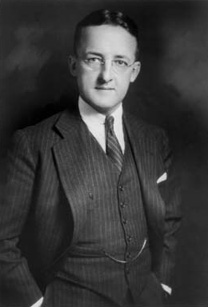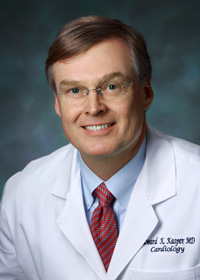 E. COWLES “COKE” ANDRUS, Med 1921, was a worldwide leader in cardiology and instrumental in its development as an independent medical discipline and major component of modern medicine. A faculty member at Hopkins for more than 50 years, he made significant contributions to heart research, teaching, and patient care. Dr. Andrus was the first director of the Cardiology Division, served as assistant dean of the medical faculty, and founded and directed the Cardiovascular Division.
E. COWLES “COKE” ANDRUS, Med 1921, was a worldwide leader in cardiology and instrumental in its development as an independent medical discipline and major component of modern medicine. A faculty member at Hopkins for more than 50 years, he made significant contributions to heart research, teaching, and patient care. Dr. Andrus was the first director of the Cardiology Division, served as assistant dean of the medical faculty, and founded and directed the Cardiovascular Division.
President of the American Heart Association from 1954 to 1955, Dr. Andrus also held many federal government advisory positions, including chief of the Division of Medicine in the Office of Scientific Research and Development. His national and international standing in the field of cardiology was reflected in his appointment by President John F. Kennedy to chair the Second National Conference on Cardiovascular Disease in 1963. He remained an active clinician and teacher until his death in 1978 at the age of 82.
Held by Edward K. Kasper
 EDWARD K. KASPER, A&S 1979, the E. Cowles Andrus Professor of Cardiology, has taught medical students, clinical residents, and research fellows and treated thousands of patients at Johns Hopkins since 1987. He is clinical director of the Johns Hopkins University School of Medicine’s Division of Cardiology. As clinical head of the Division of Cardiology, he oversees a group of 713 people, including 102 faculty and 87 fellows, who treat more than 4,000 inpatients and nearly 30,000 more outpatients a year.
EDWARD K. KASPER, A&S 1979, the E. Cowles Andrus Professor of Cardiology, has taught medical students, clinical residents, and research fellows and treated thousands of patients at Johns Hopkins since 1987. He is clinical director of the Johns Hopkins University School of Medicine’s Division of Cardiology. As clinical head of the Division of Cardiology, he oversees a group of 713 people, including 102 faculty and 87 fellows, who treat more than 4,000 inpatients and nearly 30,000 more outpatients a year.
An expert in chronic heart failure and the heart transplantation that often results from that disease, Dr. Kasper will continue his research into the biological origins of heart failure and the underlying reasons why the body rejects some transplanted hearts and not others. Most recently his research has focused on potential blood tests for predicting the earliest signs of heart failure and an organ recipient’s risks of rejecting a heart transplant.
Dr. Kasper is a fellow of the American College of Cardiology and the American Heart Association, and has authored more than 70 articles, two books and many book chapters on various aspects of heart failure and transplantation.
 E. COWLES “COKE” ANDRUS, Med 1921, was a worldwide leader in cardiology and instrumental in its development as an independent medical discipline and major component of modern medicine. A faculty member at Hopkins for more than 50 years, he made significant contributions to heart research, teaching, and patient care. Dr. Andrus was the first director of the Cardiology Division, served as assistant dean of the medical faculty, and founded and directed the Cardiovascular Division.
E. COWLES “COKE” ANDRUS, Med 1921, was a worldwide leader in cardiology and instrumental in its development as an independent medical discipline and major component of modern medicine. A faculty member at Hopkins for more than 50 years, he made significant contributions to heart research, teaching, and patient care. Dr. Andrus was the first director of the Cardiology Division, served as assistant dean of the medical faculty, and founded and directed the Cardiovascular Division.